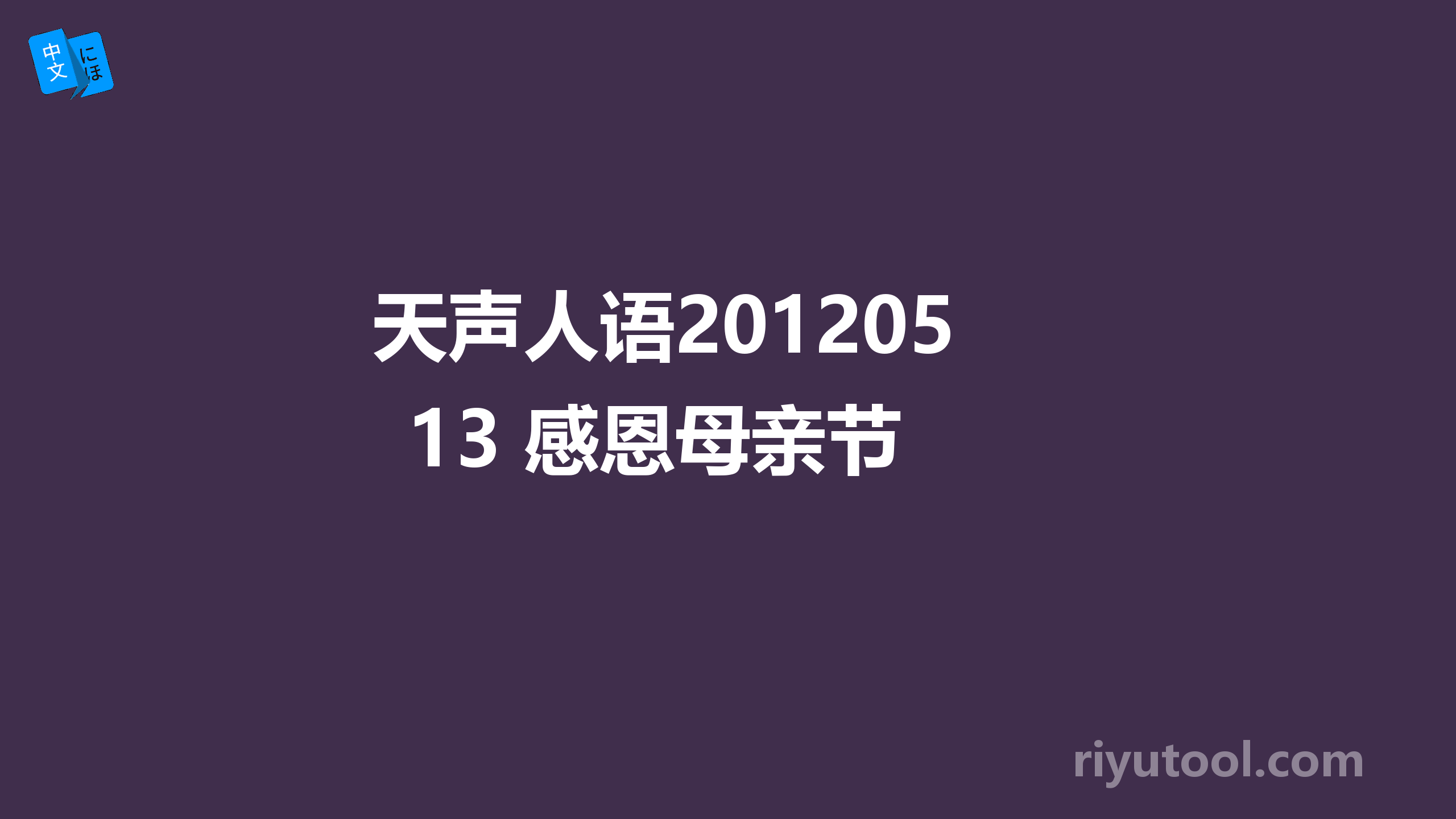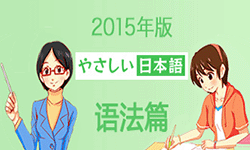天声人语20120513 感恩母亲节
本帖最后由 susie27 于 2012-5-14 10:27 编辑母と子をうたった詩歌や物語は多いけれど、機微にふれてほろりとさせ、思い出させて郷愁を誘うのは、庶民派の川柳だろうか。〈添乳(そえぢ)したまゝだと気附(きづ)く明(あけ)の鐘〉麻生葭乃(よしの)。赤子に添い寝して、乳を飲ませながら眠ってしまった母の図である
颂扬母子之情的诗歌和故事有很多,但从微妙处入手,让人情不自禁地感动落泪,并能唤起记忆中的乡愁的,恐怕要数民间的川柳吧。“喂奶哄睡时,不觉到天明”(麻生葭乃)。这首川柳描绘出一幅哄儿入睡的母子亲情图。母亲侧卧着给躺在身边的孩子喂奶,喂着喂着便睡着了。
▼下の子が生まれて母さんを独り占めすると、まだ幼い兄や姉は少し寂しくなる。〈上の子は足だけ母にふれて寝る〉丸山弓削平(ゆげへい)。そっと伸ばした足に母の足。この場面、「父」では代用がきくまい
一旦弟弟妹妹出生独占了母亲的爱的话,依然年幼的哥哥姐姐就会感觉到有些寂寞。“大一点的孩子只能把脚贴在母亲身上入睡”(丸山弓削)。悄悄伸出一只脚搭在母亲的脚上。这样的场景,“父亲”是无法替代的。
▼そんな、もろもろへの感謝や追慕を届ける母の日である。ここ数日、花屋さんの軒先は道までカーネーションがあふれている。百花の咲き満ちる初夏(はつなつ)だが、きょうの日の、この花の役どころはゆるぎない
今天,正是表达诸多的感谢和怀念的母亲节。这些日子,花店前的康乃馨一直摆到了大道旁。虽说是百花争艳的初夏季节,然而今天,这种花的主角地位却是不可撼动的。
▼昨年秋の声欄(名古屋本社版)に、70代の女性が寄せていた。小1だった娘さんが「おこづかいをつかってしまい、カーネーション1本しかかえなくてごめんなさい」とたどたどしい字で書いた手紙を宝物にしているそうだ。一輪のあたたかさが、胸の中に宿り続けたことだろう
去年秋天本报名古屋版的读者之声栏目,曾受到了一位70多岁女性的投稿。刚上小学1年级的女儿给妈妈写了一封信,“我用妈妈给的零花钱,只能买1支康乃馨,对不起了,妈妈”。这封用稚气未脱的字写成的信,据说一直被这位母亲像宝物一样珍藏着。那一朵花的温暖,恐怕至今仍在胸中留存着吧。
▼母の日の起源は100年余り前、米国のある女性が亡き母を偲(しの)んだ追悼会とされる。亡母の好んだ白いカーネーションを捧げ、参加者にも手渡したという。共感を呼んで全米に広がり、日本でも戦後、花の名とともに定着した
母亲节起源于100多年前的美国,当时有一位女性为了纪念逝去的母亲而举办的追悼会。据说那位女性手捧亡母喜欢的白色康乃馨,交到每一位与会者的手中。花中寄托的对母亲的追忆之情引起了很多人的共鸣,马上在全美流行起来。这个节日在战后的日本,也和花的名字一起扎下根来。
▼人はいくつになっても親の子ども。歌壇の重鎮だった窪田空穂に一首ある。〈八十五の翁となれど母おもへばただになつかし今日は母の日〉。思い出の国にも、感謝は届くはずである。
我们无论长到多大都是母亲的孩子。歌坛大师窪田空穂有这样一首和歌。“虽然已经变成了85岁的老翁,但一想到母亲,却只有怀念。今天是母亲节”。这样的感谢,应该也能传递给现在这个充满了回忆的国家。
......思い出の国にも、感謝は届くはずである。
......这样的感谢,应该也能传递给现在这个充满了回忆的国家。
这里的「国」是指家乡。[充满了回忆的」属误译。
最后一句值得推敲,有人把它翻译成:感谢之情一定也会传递到天国的。这里应该指“记忆中的家乡”吧。大家觉得呢?
问过日本人,他说这里应该就是指天国,思い出指的是母亲。
VOX POPULI: Carnations symbolize longing for our mothers touch
Of the many poems and stories about mothers and children, down-to-earth "senryu" poems seem to be the ones that really pull at peoples heartstrings and fill their hearts with sweet nostalgia.
For instance, a charming piece by Yoshino Aso is about a mother who was awakened by the sound of a bell at dawn and realized that she had fallen asleep while nursing her baby.
Here is another charmer by Yugehei Maruyama: "With only his foot touching his mother/ The older child sleeps." This is about a toddler who feels a bit left out because he can no longer monopolize his mother after the arrival of a new baby. He tentatively stretches his leg until his foot touches his slumbering mother and then falls asleep contentedly. The poem would not work if the mother were replaced by his father.
Mothers Day is for people to thank and remember their mothers. For a few days leading up to the day, flower shops in Japan overflow with carnations. Early summer brings out colorful flowers of all kinds, but the carnation is definitely the flower of choice on Mothers Day.
A letter from a woman in her 70s appeared last autumn in the letters to the editor section of The Asahi Shimbun’s Nagoya edition. She said she still treasures an old letter, written in an unformed hand by her daughter, who was then in the first grade of an elementary school, apologizing for being able to buy only one carnation because she had already spent most of her pocket money.
I can well imagine how that single carnation must have continued to warm this mothers heart for decades.
Japan’s Mothers Day is said to have originated in the United States about one hundred years ago, when a woman held a memorial service for her late mother. The latter had loved white carnations, and the daughter handed them to everyone who attended the service. Many people were touched by the service, and the idea spread across the nation. It was introduced to Japan after World War II, and the carnation remains the flower of Mothers Day here.
Everyone is someones child, no matter how old they are. Utsubo Kubota (1877-1967), a prominent poet, penned this piece: "Even though Im an old man of 85/ My heart fills with longing when I think of my mother/ Today is Mothers Day."
Our messages of love and thanks will surely reach our mothers, even if they are no longer with us.
—The Asahi Shimbun, May 13







